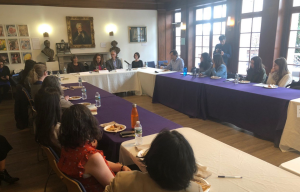– As prepared –
Statement by H.E. Mrs. María Fernanda Espinosa Garcés, President of the 73rd Session of the UN General Assembly
27 March 2019

Good afternoon!
It’s great to be in the home of Eleanor Roosevelt – one of my human rights heroines. My job as President of the General Assembly is tough but it does have its perks. And being with you in this beautiful house is definitely one of them. I’m very grateful to Allan for helping to arrange this, and, of course, to Roosevelt House for this opportunity.
I spent a lot of time in New York about 25 years ago, when I was studying Environmental Geography at Rutgers. Some things are still the same – the traffic, the constant sirens. The coffee is a bit better now!
But in many ways, the city – and the world – are unrecognizable. Back then, we were living through what many people called a “unipolar moment”.
After decisive Security Council action on Kuwait, there were hopes for a new era of multilateral action. Of course, not long after, Rwanda and Srebrenica proved tragic reminders of the international community’s failure to keep its promise of “never again”.
But there were bright spots too. Moments that were symbols of the world coming together. For example:
- The Rio Conference that created the UN conventions on biodiversity, desertification and climate change.
- The creation of the Office of the High Commissioner for Human Rights.
- The global movements to “make poverty history” and “drop the debt”.
- And the Beijing Platform for Action for women’s empowerment.
Dear friends,
Today, there is pushback against many of these achievements. Civil society space is shrinking. International law is being undermined. Multilateralism itself is being questioned.
Across the world, nationalist populism and extreme ideologies are on the rise. The General Assembly discussed these issues just two days ago.
I am sure that everyone in this room recognizes that we need global cooperation like never before. That we have no hope of addressing issues such as climate change unless we work together. But it is harder to make that case to those who feel like the international system has failed them: because they can’t get a job; because they can’t afford food; and because social protection systems are becoming less and less dependable.
Every day, I work with governments and make the case for multilateralism. But if we are to succeed, we must reach out beyond our traditional constituencies and convince people on the streets that multilateralism can deliver for them.
So how do we challenge the image of the UN being all talk and no action? A bureaucracy covered in red tape?
First, we must admit the red tape is real. A big part of my job involves working with states to find ways to do things more efficiently. Finding consensus among 193 States in a fast-changing world with growing divergencies over previously shared values and norms can be hard. We should be honest about these challenges.
Second, and in parallel, we must do more to communicate our successes. The creation of the international human rights framework, for example. The huge strides we have made on reducing child mortality, on getting girls into schools.
And third, we must prove that what we do is relevant to people’s daily lives.
If we went out on the street now, how many people would know about the Sustainable Development Goals or the Universal Declaration of Human Rights? How many people would know the UN plays a crucial part in almost everything they do, from boarding a flight to using GPS on their phones? And that their lives and those of their children and grandchildren will be better and more secure if countries urgently implement their commitments to address climate change?
Dear friends,
Making the UN relevant to all, listening to people’s views – these are priorities for me as President of the General Assembly. That is because unless people see the work of the UN as truly relevant to their day to day lives, and support it, Governments see no incentive in taking the politically difficult decisions we need today. So, whenever I travel, I meet with civil society. I try to include youth perspectives in every event I hold.
I have focused on issues that reflect the needs of people – for example, access to decent work; greater participation by women in politics.
And I have focused on areas where we can deliver results. For instance, I have launched a campaign against plastic pollution. This includes external advocacy but also action to help the UN lead by example: I hope that, soon, there won’t be any single-use plastics in our buildings.
Dear friends,
There are people at the UN who are working hard to make it more effective, transparent and accountable. I hope you will take this message home with you. And I hope you will work with us to create a new vision of people-centered multilateralism.
That is why I am here today – to listen to your ideas. So thank you very much for listening. Now it’s over to you!
 Making the United Nations Relevant to all People
Making the United Nations Relevant to all People